How might sleep/wake schedules impact
romantic relationships?
We often consider a defined set of criteria when vetting potential romantic partners. We evaluate their character and personality, their attractiveness, their occupation, and hobbies. Essentially, we’re interested in getting to know people, figuring out who they are, and weighing the compatibility for a romantic relationship. While we learn about their waking days, learning about their sleep schedules is not often considered. How important is learning about a potential partner’s chronotype, or sleep/wake preferences?
What’s a chronotype?
Your chronotype is your preferred time of day to be active. It’s the time interval that you feel the most energized or “mentally sharp.” For example, the Morningness Eveningness Questionnaire asks people to indicate the time that they prefer to do a range of activities, such as exercising or meeting with friends, if they had no time constraints. Specifically, it asks when they would like to be active if they did not have a set, daily schedule (test your chronotype here). Greater preference for earlier times indicates morning types, and later preference indicates evening types. While work constraints often dictate people’s sleep schedules, most of us default to our preferred schedules during days off. Some research suggests that morning types sleep better than evening types and tend to experience less psychological disturbance (e.g., stress, depression). However, a recentstudysuggest that this is not always true. Some evening types sleep well and have good mental health.
Research shows that our preferences for sleep and wake times vary by age and gender/sex and may even play a role in romantic partner selection. Sleep/wake preferences are different for certain age groups, women, and men. For example, older adults, both women and men typically go to bed earlier and wake up earlier than young and middle-aged adults. Younger men generally prefer evenings more than younger women. Differences in chronotype could impact partner selection and relationship satisfaction.
Do Chronotypes Really Matter For Romantic Relationships?
The short answer to this question is yes, but I would argue that chronotype similarity is most important for those with inflexible daily schedules or poor problem-solving skills. Romantic partners with similar chronotypes generally report higher relationship satisfaction than those who have partners with misaligned chronotypes. Sleep/wake schedule alignment allows for a key factor in maintaining good relationships: time.
Recentresearchshows that time spent with a partner is related to finding more meaning and happiness (see conceptual model below, Method A). Thus, a misaligned sleep/wake schedule is not the determining factor for relationship. Problem-solving skills may be necessary to find common time to spend together and dampen time issues that result from differing sleep/wake schedules (see conceptual figure below, Method B). Some have even mentioned potential benefits of chronotype dissimilarity between romantic partners, especially during the early stages of co-parenting. For example, different sleep/wake schedules make it easier to “take shifts” when caring for a young child. While one parent is sleeping earlier in the night, the other may happily stay up later and go to bed when the other partner wakes up. Taken together, there may be positive and negative aspects to maintaining a relationship with someone who has a different sleep schedule, but effective problem-solving could help dampen some of the negative aspects for partners with dissimilar chronotypes.


The Bottom Line: Relationship Satisfaction May Depend More on Effective Problem-Solving Than Chronotype
People who have similar sleep/wake schedules are more likely to have higher relationship satisfaction than those who have different schedules. However, time spent together may be an underlying factor that explains the relationship between chronotype similarity and relationship satisfaction (as conceptually depicted above). To my knowledge, this idea is empirically untested — there is no research directly showing that time explains the link between chronotype similarity and better perceived relationship quality. However, given the links shown betweentimespent with a partner and relationship satisfaction, as well as the positive association between better problem-solving skills and reports of better relationships, a similar sleep wake schedule is not be the only factor involved with a successful romance.
So the next time that you’re vetting a potential partner, you may consider chronotypes. But you may also want to ask how good are your problem-solving skills, and how are you with time management?
Note: I am currently dating someone who has a different chronotype. While I believe in the views presented in this article, have done the research on these ideas, and have given a broad account of the findings, it is important to acknowledge that I may be unknowingly expressing biases regarding the importance of chronotype similarity for relationship success.
Enjoyed this post and want to say thanks?